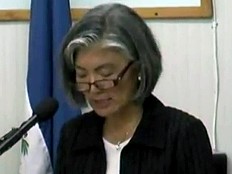|
||||||||||||||||||
| Download the revised decree and electoral calendar, published in the official journal |
|
|
Haiti - Social : «The President's strong and sustained leadership on human rights is central» - Kyung-wha Kang 07/07/2011 07:27:02
Kyung-wha Kang, United Nations Deputy High Commissioner for Human Rights, who is visiting Haiti from 2 to 6 July 2011, gave a press conference, during which she says having had discussions with the President Martelly, the President of the lower Chamber and other key members of Parliament, the Protectrice du Citoyen, human rights defenders and civil society organisations. "I have also held meetings with the new Special Representative of the Secretary General, Mariano Fernandez, other UN colleagues, and with the diplomatic corps." Kyung-wha Kang said that she was "greatly heartened by the deep commitment of President Martelly to realising the fundamental rights of the Haitian people, including economic and social rights, such as education, health and adequate housing, as conveyed during our very fruitful meeting. The President's strong and sustained leadership on human rights is central to addressing systemic failings of the rule of law and providing solid progress on economic development and reconstruction efforts." In addition, she commend "the efforts of the Haitian government and of the international community to protect the population during the humanitarian crisis that followed the earthquake" stressing that "these interventions saved many lives, especially among the most vulnerable, including women, children, the elderly and those with disabilities." Kyung-wha Kang said that "the aid effort did not, and indeed could not, address the major deficiencies in Haitians' access to all their basic rights [...] The realization of economic and social rights is key to long-term stability in Haiti." Regarding the rehousing she indicated during this conference that she "welcomes the plans of the new authorities to work together with the international community to advance the sustainable return of the residents of six camps and the reconstruction of their homes, as well as the provision of improved services in their neighbourhoods of origin. But I firmly believe that the initiative needs to form part of a broader plan to increase access to adequate housing in both camps and impoverished neighbourhoods. Only a comprehensive housing plan combined with major job creation can break the cycle of extreme poverty and the failure to realise economic and social rights in which Haiti has been trapped for so many years" adding that "the emphasis should be placed on human rights in the context of development and within the reconstruction process. This means using human rights standards to evaluate reconstruction plans and ensuring non-discrimination, transparency and the participation of beneficiaries when taking decisions about reconstruction..." United Nations Deputy High Commissioner for Human Rights indicates that "several interlocutors raised with me their concern at the cholera epidemic, including concerns that it may have been inadvertently introduced to Haiti by personnel working under the UN. From the voices that I heard many people would like more information about the epidemic, its origins and prevention efforts. This is something of deep concern to me that I will transmit to competent authorities within the UN." "There are serious civil and political rights concerns," she says, adding be concerned about the situation of children in the border area indicating that there is "violation of their most fundamental rights, and in total impunity" and that there is "an urgent need for greater resources to be devoted to the institutions charged with the protection of children, and also for the legal framework", specifying to have discussed this issue with parliamentarians, she "was encouraged by their determination to put this initiative high on the legislative agenda." Concerning the women, Kyung-wha Kang said "I welcome the existence of a national plan of action to combat domestic violence, and encourage all State entities to collaborate closely and increase their efforts to tackle these endemic and abhorrent practices which cause so much suffering to so many women in Haiti" She also took the opportunity to commend the efforts to strengthen the PNH by drawing "the attention on the to the vetting process that began in 2007 to evaluate and certify police officers for integrity and respect for human rights. To date, no decisions have been taken on any of the 3,400 files that have been presented to the General Inspectorate. It is time to act." " I welcome the efforts of the judiciary to reduce the very high levels of prolonged preventive detention and encourage further such initiatives. The reforms of the judiciary that were approved four years ago have to be implemented if the judiciary is to gain greater capacity and autonomy. The new President should promptly appoint a president of the Cour de Cassation. There needs to be greater investment in the judiciary, not just in buildings, but in adequate working conditions for its staff. It is imperative that transparent, fair, and timely procedures be established for the selection as well as for the removal of judges." Kyung-wha Kang indicates that "in January of this year, the High Commissioner for Human Rights, Navi Pillay, reminded the Haitian authorities of their obligation to investigate the serious human rights violations that took place during the rule of Jean Claude Duvalier, and for which no statute of limitations exists under international law" reiterating "the High Commissioner's offer of support and technical assistance to the authorities of Haiti and I hope to work with the new authorities in this regard. In addition to the judicial process, I fully support the initiative to establish a Truth Commission." "The Haitian State is responsible for respecting, protecting and realizing human rights in Haiti. It is only through national institutions that solutions to these problems can come. A new government will soon be formed. Together with Parliament and the judiciary, they hold the key to transforming Haiti and fulfilling the aspirations of its people." "...I would like to acknowledge the courage and the resilience of Haitians. I recall the flowers and the crops I saw growing in the small gardens of people living in camps; the rebuilding, and starting of new businesses, and creation of new jobs. The reconstruction effort, and indeed the new construction in places where it never existed before, is a Haitian effort to meet Haiti's human rights responsibilities," concluded Kyung-wha Kang, Deputy High Commissioner of the United Nations. HL/ HaitiLibre
|
|
|
Why HaitiLibre ? |
Contact us |
Français
Copyright © 2010 - 2026 Haitilibre.com |





